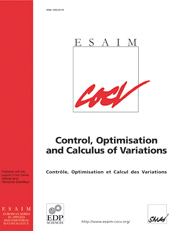Article contents
Relaxation of an optimal design problemin fracture mechanic: the anti-plane case
Published online by Cambridge University Press: 02 July 2009
Abstract
In the framework of the linear fracture theory, a commonly-used toolto describe the smooth evolution of a crack embedded in a bounded domain Ω is the so-calledenergy release rate defined as the variation of the mechanicalenergy with respect to the crack dimension. Precisely, thewell-known Griffith's criterion postulates the evolution of thecrack if this rate reaches a critical value. In this work, in the anti-plane scalar case, weconsider the shape design problem which consists in optimizing thedistribution of two materials with different conductivities in Ω in order to reducethis rate. Since this kind of problem is usually ill-posed, wefirst derive a relaxation by using the classical non-convexvariational method. The computation of the quasi-convex envelope ofthe cost is performed by using div-curl Young measures, leads to anexplicit relaxed formulation of the original problem, and exhibits fine microstructure in the form offirst order laminates. Finally, numerical simulations suggest thatthe optimal distribution permits to reduce significantly the value of the energy release rate.
- Type
- Research Article
- Information
- ESAIM: Control, Optimisation and Calculus of Variations , Volume 16 , Issue 3 , July 2010 , pp. 719 - 743
- Copyright
- © EDP Sciences, SMAI, 2009
References
- 10
- Cited by


